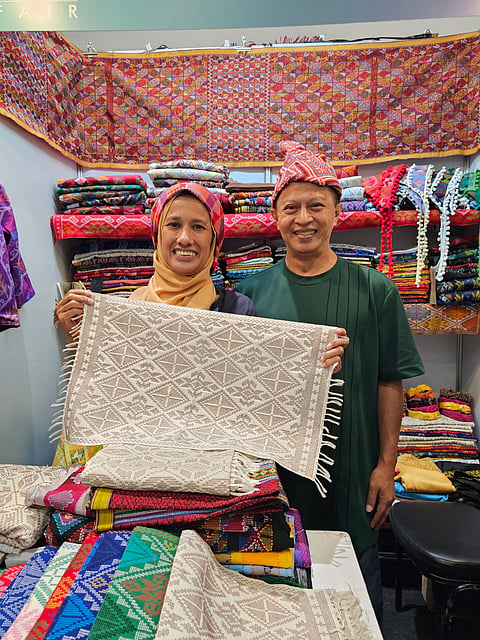
- NEWS
- the EDIT
- COMMENTARY
- BUSINESS
- LIFE
- SHOW
- ACTION
- GLOBAL GOALS
- SNAPS
- DYARYO TIRADA
- MORE

Weaving is an enduring craft, and indigenous folks like "grandmaster weaver" Evelynda Otong dedicate themselves to ensuring that traditions, such as woven textiles from the Yakan community, remain an indelible part of Philippine culture.
Hailing from Lamitan, Basilan, the fourth-generation weaver proudly showcased the finest Tennun products of the Yakan tribe of Mindanao during the annual National Arts and Crafts Fair held in Megamall.
Often overlooked, these textiles hold unique stories woven into each thread by the skilled hands of her people. These artisans present their elaborate designs to reignite appreciation for art and its indispensable function in preserving our local identity.
With nearly 40 years of weaving experience, Evelynda began her journey into her tribe's traditions at the age of six. As she immersed herself in learning the craft, she gained a deeper understanding of her environment and community history through her designs. What started with a glass coaster evolved into her life's vocation, preserving a tradition she now passes on to her children.
'Traditional' to the core
Today, the intricate artistry of Yakan weaves has yet to captivate many young minds, but for Evelynda, it is her calling to uphold this tradition, albeit a formidable task. The cloth undergoes a meticulous process, involving the selection and plotting of designs, installing sticks, choosing the appropriate thread and three days of weaving using a backstrap loom, unlike the more conventional foot-pedal looms.
While more convenient weaving processes are available, Evelynda opts to stay true to her roots.
"Kailangan lahat gawa mula sa backstrap loom dahil iyan ang identity ng Yakan weaving. 'Pag iba ang ginamit namin, hindi na siya matatawag na Yakan. Na-innovate na siya (Everything should be done on the backstrap loom because that is the identity of Yakan weaving. If we use something else, we cannot call it Yakan. It would have been innovated already)," she said.
In the past, Evelynda's grandmothers used pure cotton for their Tennun, employing natural fibers obtained from abaca leaves, which were hand-dyed. Unfortunately, due to the unavailability of cotton in their town, they have shifted to using commercial polycotton, resulting in a slight departure from their traditional weaving methods.
Staying 'connected'
Despite this, Evelynda and her fellow Yakan weavers strive to maintain a connection to their heritage, ensuring that the essence of their craft remains undamaged. Evelynda spearheads training sessions for children, starting them off with simple coasters to grasp color combinations and patterns, gradually progressing to crafting place mats, runners and eventually intricate clothing designs.
To propagate their local tradition, Evelynda believes it is her obligation to teach her two daughters, who began their training at the age of six.
"Nakatulong sa anak kong nasa college [ang weaving] sa pag-aaral niya kasi doon siya kumukuha ng pamasahe at pang-self-support (Weaving helps my daughter in college because it helps her pay for her fare and to support herself)," she said.
As her primary means of livelihood, Evelynda manages Tuwas Yakan, a store in Zamboanga that directly offers Yakan weaving products from the community's talented weavers. The store has a Facebook page, allowing them to showcase and market their products.
Evelynda not only weaves her creations but also supports her cousins in the weaving industry by purchasing and promoting their products. She also supplies threads for Yakan weavers' businesses and takes commissions from time to time.
During the pandemic, Yakan weavers faced challenges due to the closure of thread stores and disruptions in imports. Evelynda and her family relied on their farming efforts until the demand for masks surged beyond clinical use. Adapting to the trend, she revamped her business by making masks fashionable.
Their commitment to their craft enabled them to fulfill orders that reached international borders, with the largest bulk order comprising 800 pieces for a Filipino community in Pennsylvania. Their renowned mask and headband combo gained popularity in the streets of New York and California.
'Keep on weaving'
Grateful for the opportunity to showcase their ancestral heritage during the National Arts and Crafts Fair, Evelynda offered a wide range of Tennun goods in her stall, from small accessories to elaborate and kaleidoscopic blazers, Filipiniana attire, polos, jackets, skirts and backpacks.
Prices, ranging from P100 to P4,000, vary based on the intricacy of the weaving method, even when products share the same design and pattern, as the difference lies in the number of wefts used. Some employ a single weft, while others use four wefts in one stick, resulting in a thicker fabric.
Evelynda finds it remarkable that amidst the transition to a technologically advanced world, the Philippines perseveres in preserving traditions like Yakan weaving, ensuring their integration into our enduring local culture, rather than reducing them to mere memories. In addition to trade fairs at SM Megamall and Glorietta last October, there's the Pakaradyan, the founding anniversary of Basilan, where Yakan community weavers come together to showcase and celebrate the history and creativity of their Tennun.
"Keep on weaving, para maipass on natin sa ating mga apo para meron silang maipagmalaki at ma-inspire sila sa sarili nilang kultura (so we can pass on the craft to our grandchildren and they would have something to take pride in and be inspired by their own culture)," she said, encouraging traditional weavers to keep the flame of their craft alive.
